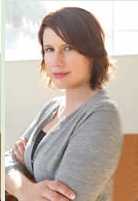 Personally, I have remained much inspired by the talk of Paula Morris, who was the last guest speaker of our series. Paula is an author and teaches Creative Writing at Stirling. In fact, listening to her felt like ‘Yes, I will write more myself’. Firstly, she addressed the myths people nourish about writers, e.g. the writer isolating themselves, being oblivious to the world, while, in fact, they have another job instead, to make a living. Also, there is the opinion they would compromise for anything that would stimulate sales. However, in the case of popular writers, they might not be prepared to, – an example being Jonathan Franzen, who did not like Oprah’s Book Club (endorsement) sticker on The Corrections. Another ‘myth’ that Paula wanted rid of is that people seem to feel each and every publication be available on Amazon. Not true. Amazon is not hosted in every country, books are out of print, and smaller publishers may not be able to afford distribution through that channel.
Personally, I have remained much inspired by the talk of Paula Morris, who was the last guest speaker of our series. Paula is an author and teaches Creative Writing at Stirling. In fact, listening to her felt like ‘Yes, I will write more myself’. Firstly, she addressed the myths people nourish about writers, e.g. the writer isolating themselves, being oblivious to the world, while, in fact, they have another job instead, to make a living. Also, there is the opinion they would compromise for anything that would stimulate sales. However, in the case of popular writers, they might not be prepared to, – an example being Jonathan Franzen, who did not like Oprah’s Book Club (endorsement) sticker on The Corrections. Another ‘myth’ that Paula wanted rid of is that people seem to feel each and every publication be available on Amazon. Not true. Amazon is not hosted in every country, books are out of print, and smaller publishers may not be able to afford distribution through that channel.
Paula then talked about the author–publisher (editor) relationship, and the frustration of many writers, who complain that they aren’t looked after well enough, or that the publisher didn’t do enough for their book to do well. On the other side, there’s the writer, who also needs to become proactive. Not only has he or she to win the publishing team over, so that they will care more about the book, and put more effort towards its realization, but also, if an author won’t show initiative, he or she might sell the book to a publisher to see it disappear before long. Claire asked the curious question, how much it would be also about the team liking you, the author, as a person. Paula’s answer: a lot. No surprise. Nowadays, authors are expected to have Facebook and Twitter accounts, a website, a blog, etc. Their own initiative counts, literally. Paula is a great example herself. On one occasion, when living in the US, she promoted herself, with her husband designing book flyers, to be sent out to bookshops, who, in turn, invited her to do signings. These things make the publisher happy, as the author themselves has provided for a growth in sales. Ideally, the author would subsequently receive more attention from the publisher’s part. However, this may depend on how well the book will do after all. Curiously, if you’re a poet, your book won’t be expected to sell as well as if you were doing fiction. At the bottom line, if the records tell that your book has done great, you are likely to get another deal with your publisher.
According to Paula, everything is about getting your product ‘out there’. She also thinks that you want slightly too many copies of your book on the market, and that it is a good sign if there are returns, as this would confirm that there are a lot of copies out there. Additionally, Paula emphasized the status of London and New York as centers of publishing. Once your book hits London or New York, it would go out in the world – Australia, New Zealand, South Africa, India…
Paula Morris, in my opinion, has been one of the most inspiring guest speakers we had. The effortlessness and candidness she applied speaking about her work, views, and experiences invigorated her talk to evolve into one ever so multi-faceted, relevant, and genuinely stimulating.